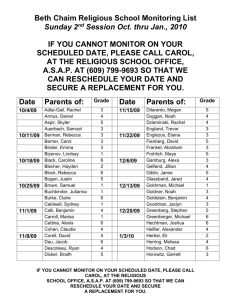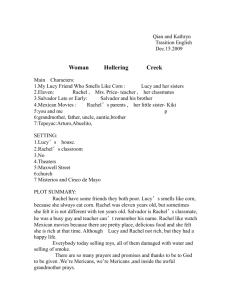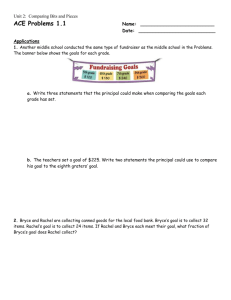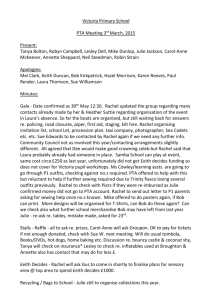DALHOUSIE REVIEW Summer/Fall 2012 Dalhousie University
advertisement
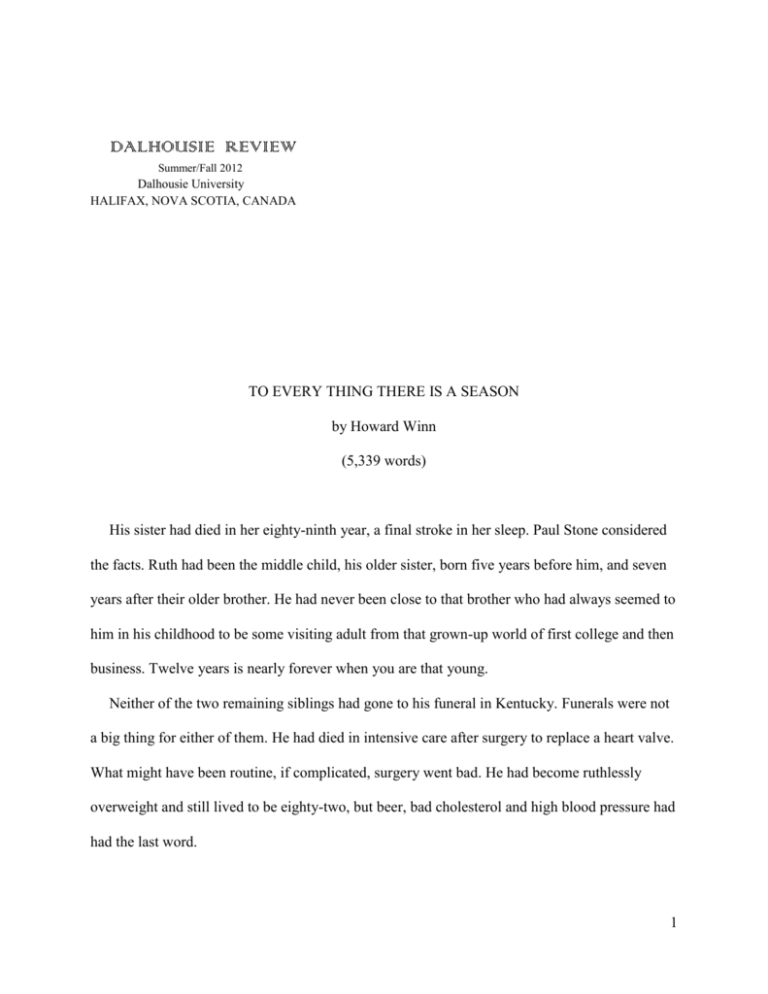
DALHOUSIE REVIEW Summer/Fall 2012 Dalhousie University HALIFAX, NOVA SCOTIA, CANADA TO EVERY THING THERE IS A SEASON by Howard Winn (5,339 words) His sister had died in her eighty-ninth year, a final stroke in her sleep. Paul Stone considered the facts. Ruth had been the middle child, his older sister, born five years before him, and seven years after their older brother. He had never been close to that brother who had always seemed to him in his childhood to be some visiting adult from that grown-up world of first college and then business. Twelve years is nearly forever when you are that young. Neither of the two remaining siblings had gone to his funeral in Kentucky. Funerals were not a big thing for either of them. He had died in intensive care after surgery to replace a heart valve. What might have been routine, if complicated, surgery went bad. He had become ruthlessly overweight and still lived to be eighty-two, but beer, bad cholesterol and high blood pressure had had the last word. 1 “If he had taken care of himself he might have survived longer. Father lived until ninety and mother to ninety-four. He should have supported those genes with a sensible life style. Too much beer and good living and the only exercise was golf and that meant riding around in a cart,” his now late sister had commented at the time. “And I am too old for that kind of travel, arthritic knees, sore back, and all. Plane travel would just kill me.” He could not go, either. He was taking daily radiation treatments for prostate cancer and could not skip them for the time the trip would have taken. Save oneself, he had thought, even if the three nieces might not understand. Family is family, they probably thought, and they did not like their father’s second wife and widow, so apparently they were left with her, her daughter, and their own families at the rites. Although, the two surviving siblings thought, there were probably multitudes of his friends from business and the civic organizations to which he gave much time. The Masonic Order, the Shriners, the Elks, their church, all would contribute mourners, the two surmised in self-justification The Shriners would probably do it up in fine style, they guessed, fezzes and all. Now Ruth Greenleaf, born Stone, was gone, too, he said to himself. Her daughter, Rachel, had phoned his son with the news. She had said to Will that she could not find her mother’s address book with her uncle’s phone number in it, and she had some urgent business to deal with, so she called her cousin’s cell phone number which she happened to have on her own phone. Then the news had been relayed by his daughter-in-law who had been home and able to take the message. “She has gone to a horse show,” he exclaimed to his wife, Winifred, when he eventually tried to phone back. ” The daughter of the deceased has gone to a horse show and left her infirm father 2 and his walker to deal with the undertaker, I guess. Or maybe the stable hand. Would you believe that?” he said to her as he hung up the phone. “Anything,” she said. “Anything,” wiping away tears. “But there is the new care-giver,” Her sister-in-law, Ruth, had been a favorite of hers. Feisty and smart, a writer of young adult novels and a former librarian before her marriage to the Columbia University professor of higher mathematics. Her husband, Morton Greenleaf, was an acknowledged expert in the statistical laws of probability, as well, often consulted about such matters, and a prize catch as a visiting professor at places like the Technion, Israel’s Institute of Technology, Stanford, or the University of California’s various campuses. He always returned to Columbia with great fanfare and added perks from the administration to make that position even more attractive. Besides, he was a confirmed New York City inhabitant and could not really imagine living anywhere else, even though he had been born in Philadelphia. “Just like W. C. Fields,” he would often say. That marriage had been a late one for both and the older couple had decided to adopt rather than attempt parenthood on their biological own. The first child was an infant boy they named David, from an agency in New York City. The second was the daughter, from the same agency. Both had been charming and extremely attractive children as they grew older. The boy was super active, however, very smart, and a handful for the two older parents, both involved in professional careers. He had been medicated with Ritalin for hyperactivity but luckily that did not seem to slow down his intelligence; although it may have made him more receptive to other personal experiments with drug use when he hit adolescence. The little girl was a beautiful ornament for the family, but she turned out not to be as clever as her brother. In fact, her parents 3 surmised she might be only average, and that was not exactly to the taste of these educated professionals. It particularly irked her mother who had graduated with honors from Vassar, been the first woman hired out of college as a copy writer for a major ad agency during World War II when men became scarce, had later excelled doing graduate work at Columbia University, and who could write and sell perceptive novels for the young. A creative and intellectual powerhouse, her brother said. She had obviously expected some kind of copy of herself and instead she had gotten a cute little girl who loved pretty clothes and horses. Ruth Greenleaf often found the child surveying herself in the full-length mirror in the bathroom, arranging her hair and apparently practicing smiles with her mother’s pale pink lipstick and cologne at an early age. Ruth had tried her daughter on flute lessons for a while, since it was obvious that all children in Westchester took music instruction. The child showed no aptitude for music, hated the practicing, and just wanted to get back to her horses, her clothes and her expensive adolescent suburban social life. On the other hand, the math professor husband and father, Mort Greenleaf, was obviously entranced to be the unexpected parent of such a budding beauty, even if, as a highly proficient amateur violinist, he had dreamed of playing chamber music with a talented flutist daughter. He was not to get that dream fulfilled. The adopted Rachel grew up to be a Chappaqua blue-eyed blonde who hated her first name. Her last name, Greenleaf, was the English version of Grunblatt, the last name of her dead Ashkenazi immigrant grandfather who had changed the family name to fit into the Philadelphia world where he became a grocery store owner. He sold high end groceries to Philly main liners and prepped his son for college, fame and intellectual fortune. This boy was the one who had become her father and named her after his dead grandmother. 4 Rachel had insisted sometime in the junior high school years, attending a nearly all-WASP private day school in Westchester County, on being called Ray rather than Rachel. There were no other Rachels in the school, apparently, and since at that particular age she refused to wear dresses and mostly went clothed in jeans, and often smelled of horse barns because she quickly became one of those young girls who love horses, Ray was a particularly appropriate androgynous name. However, if some time in her early teen years, when she insisted on the name change, she had been charged with being bigoted and anti-semantic she would have protested with the time-worn cliché that she had Jewish friends. She just did not want to be part of this Jewish Grunblatt /Greenleaf family with the judgmental mother whom she could never please. Oddly, she worshiped the indulgent father who brought the name Rachel Greenleaf to her even though she could not help realize his musical dream. “Such a screwed-up family, the Greenleafs,” said the surviving son to his teary wife. “But, I loved them,” she responded, “at least Ruth, Mort, and David, poor boy. Rachel is hard to reach.” “So did, do, I,” he answered, “but that doesn’t change the fact that they were screwed-up on some psychological level.” “Don’t get so professorial yourself,” she said. “And what about the funeral? Get any information about that?” “Left in the hands of a man trying to recover from heart surgery and his own minor stroke and this daughter who has never grown up but just grown older. If David had not died in his early twenties, he would be a godsend in handling these details.” He shook his head in sad dismay at life’s little tricks. All of these intellectual academic types, he thought, himself included, and we 5 have a hell of time getting things right. Maybe one can never get things right. Given the expertise of his brother-in-law, he wondered if there was a probability formula for this situation. The intellectual David would have been capable of stepping in and arranging the concluding rites for his mother, if he had not succumbed to lymphoma in this early twenties, Paul was certain from the evidence of David’s early life. He remembered the last time he had seen David, at a lunch with his parents at their home in Chappaqua. David had seemed preternaturally pale for an active twenty-something at the time, and his mother had said he really should see a doctor about being tired so much of the time. “He just does not seem to eat enough,” she had said to her brother and sister-in-law. The next thing his uncle knew David was in Columbia Presbyterian Hospital with a diagnosis of Burkitt’s lymphoma. “He is really really terribly sick,” his distraught elder sister had phoned at the time about her son. She had hoped her nephew, Will, who lived in the city could visit his cousin. Now she would be buried next to him in that modest cemetery on Quaker Road in Chappaqua. “We bought four burial plots at the time,” the newly minted widower noted in one of the many phone calls to his brother-in-law about the funeral arrangements. “Cheaper then, so it has turned out to be a good investment in death.” Mort commented with a touch of academic irony, or was it the Philly W. C. Fields speaking. The phone calls were generally to him, since his daughter seemed to limit her communications to rather terse and cryptic e-mail messages about places or times with no salutations nor polite endings. Her uncle thought it was most likely the style of electronic exchange, the influence of Face Book entries, or Twitter, favorite diversions of this niece. At least, he thought, it was never couched in the compressed short hand of telephone text messages, perhaps in deference to his generation and his age; although he had never thought his niece was very sensitive to such matters of etiquette or the needs of others. 6 In fact, he had always assumed she was resolutely contrarian when it came to respect for her elders, beginning when she entered her teens, or maybe before, when her intellectual failures as compared with her older brother became more and more evident. Cuteness did not cut it for her mother, as it did for her father. The brother remembered the singular efforts to find intellectual or creative endeavors which would set fire to the increasingly sullen young girl. The failed flute lessons were only the first of many failures on the part of his sister. There was pottery and a class in wheel throwing that did not last. The teenager said to her mother that it reminded her of playing with feces, although he believed she used the more common term, “shit.” There was the switch to the cleaner, more neutral jewelry making class, for which the daughter actually seemed to have some aptitude. So much, in fact, that after the barely successful academic struggle to get through the less demanding private day school to which she had come by failing out of the outstanding public high school named for Horace Greeley. her mother and father thought at last they had found her artistic bent. The lofty intellectual quality of that public school, and the rest of the public school system in Chappaqua, which had drawn the Greenleafs there in the first place, proved too much for young Rachel, making the necessary high school taxes an ultimate irony. After all, the parents of these two adopted children had moved out of Morningside Heights and convenient faculty housing, to go to Chappaqua because research had shown that the school system in that particular Westchester suburb was superb and worth the real estate costs and the higher taxes and the commute to the city. For Rachel’s move into higher education, both settled on the CUNY campus of the Fashion Institute. It would not be Vassar, nor Columbia but, as her mother said, one should be grateful for small favors. She would major in jewelry design. Perhaps she might even work up an interest 7 in fabrics and dress design, since it appeared to her parents that she did possess a great interest in fashion and women’s dresses, at least when decorating herself. Of course, by this point her older brother was already immersed in his undergraduate studies at Columbia where he had become fascinated with artificial intelligence, much to the delight of his professorial mathematician father. He had spent one student summer, digitalizing some program for the New York City Fire Department, a coup for an undergraduate, made with the assistance of his father’s reputation, one must admit, but his program was highly admired by the Fire Department administrators, allowed for the cutting back of personnel, and the saving of the city’s tax dollars. His mother and father were extremely proud of his accomplishment and saw this triumphant creation as evidence of the outstanding life and career to follow. At roughly the same time, during his senior undergraduate year and his sister’s first college semester, Rachel decided she did not like the demands and the atmosphere of the Fashion Institute, not to mention the commute in from Chappaqua, albeit with her father as he went in to his office at Columbia University, and she dropped out, or rather she stopped going to classes, hanging out at various coffee shops and wandering the city. She did continue to go in to town with her father in the deadly commute, and did not tell her parents she was not attending classes. Of course, this state of denial could only last just so long. At the close of the fall semester, the Registrar’s Office sent out the inevitable transcript of grades to her home with the notation of failures in all the courses for which she had officially registered. “I really wanted to go to a place with veterinarian medicine,” she cried, when confronted with the evidence. “I love dogs and cats and horses. They love you back like totally.” 8 “Completely unrealistic,” said her mother, “not with those high school grades, D minus in Biology, and I don’t think that you have lacked a sufficient quantity of love in the family that makes it necessary to seek it from dumb beasts. I like dogs, myself, and always had one or two, but you are ridiculous. How dare you dissemble with your parents? Don’t snivel. Where did you get that psychobabble about animal love, anyway?” Her father patted her head, which she shook off, and said, “Maybe you can get a job helping the local vet in Mt. Kisco, where your mother takes the dogs. It would not be being an actual veterinarian but it would be working with animals.” So that was what they did. She seemed happy at last. For the moment. Finally her love of dogs, cats and other small beasts was not enough to compensate for the drudgery of holding angry cats still for shots or the process of euthanasia for elderly, sick dogs, or having to deal with annoyed parrots, among many of the subservient tasks allotted to a vet’s mere helper. “This job has turned out to be a bummer,” she wailed to her father on a lazy Sunday afternoon when her mother was in town at some theater matinee with suburban friends. “I really really want to work with horses. I took riding lessons when I was a kid and I was actually very good at dressage. I have the blue ribbons to prove it. I want a stable with a couple of horses, at least, a ring, where I can give lessons. I could make money that way and be my own boss, Dad. “ Her father looked up from the Sunday Times and raised his eyebrows. “Would you stick with it?” he said. “You know how you have been about everything else we have tried. It would cost a bundle to make an investment like that. And I am just a college professor, not a Wall Street 9 master of the universe and your mother would have some kind of fit over that sort of move, you know that.” “Oh, Dad, you and Mom talk poor all the time, but you put out money for this house and it did not seem like a strain. You paid for the Country Day School. You each have a car. You both have a broker, so you must have investments. Mom has all these expensive antiques, and I know that you and Columbia are socking away retirement money with TIAA-CREF. I’m not totally a dummy, you know.” She wrinkled her nose. “Don’t be such a Grinch. Look what other parents around here do for their children, and I haven’t cost you anything for an Ivy League four years. Not like David.” “He is free, you know, at least as an undergraduate, But all right. We will look around. I don’t promise anything right now, and we will have to get it by your mother when the time comes, if it comes;” He looked around, apparently, found a 70 acre horse farm just over the state line in Connecticut, convenient to the Westchester horsey set, as well as that of Connecticut, and bought it in his and Rachel’s name, with a big mortgage, of course. Paul’s sister said she washed her hands of the whole thing and that the money was her husband’s to play with. The property had a large old farm house, horse barns and a covered ring as well as the requisite outdoor one where horses and riders could train. It turned out that there was a large clientele for such a facility and Rachel, with her parents, discovered that she had the touch for teaching the horse mad young girls of the area, perhaps because she had been one herself and had not really outgrown the fixation. The business prospered, enough, at least to meet the mortgage payments, Unfortunately, what was left over in the way of profits seem to go for a series of expensive cars – first an Audi, then a BMW, and 10 finally a Mercedes. Each replacement cost more money, but Rachel explained to her father that it was important in her line of work to appear as affluent as her customers, or rather their parents, in order to maintain their respect and her reputation as a big success. That condition was required to keep the youngsters coming, she said. Her mother snorted at the explanation and muttered something that sounded like “poppycock” but her daughter and husband pretended not to hear. And they did keep coming. There appeared to be a never ending supply of small girls age eight to twelve who lived for horses. Horse sweat was their cologne. It was as though they were mushrooms that just needed a bit of spring rain to pop up out of the lawns. And Rachel kept on spending. There was liposuction when she felt her hips, thighs, and butt no longer looked teen-age slim. That was followed shortly later with boob reduction. Hair treatment, spa work, tanning salons, and the acquisition of a Ford F-150 truck with a horse trailer tagging behind came to her and the farm with no introduction. “Got to have both,” she told her father, “or we can’t get to the important shows.” “Thank the good lord, she inherited a Westchester WASP button snout from those unknown birth parents,” said her mother about the personal body work, “so a nose job won’t be the next requirement.” It turned out, actually, that the next requirement, or requirements, was a series of boyfriends, some live-in and some not, now that she possessed her own farm house. Her mother overheard one of the least savory saying into his cell phone, “It is certainly great when you find one whose parents have deep pockets,” and she assumed he was talking of his latest female find, their daughter. 11 One male hunk along the way, she actually married. At least it was not the discoverer of the deep pockets, her mother had silently told herself. Twenty thousand for the wedding, Rachel told her father who told her mother. “Twenty thousand to marry that truck driver from Connecticut!” her mother exclaimed. “This is Westchester. This is Chappaqua. The Clintons live here.” Her daughter explained the facts of life to her mother while her father was, as usual, silent. Even being a mathematical whizz on the Columbia faculty had not given him solutions for this real life condition. “You can’t really get married for less, not and live with the horse people the way we do.” The twenty thousand could not buy permanence, unfortunately, and it was not long before Rachel threw the truck driver out of the farm house. She kept the truck. “He must have been the Audi,” her mother commented, “and I suppose we have the BMW and Mercedes husbands to look forward to.” Unluckily, the transaction was not as clear cut as an auto trade-in, because the discarded husband had been placed on the incorporation papers of the Horse Farm, Inc. “In order to make him feel like he was actually part of the family firm,” as Rachel explained it to her parents at the time. He demanded to be bought out, even though he had not bought in. Apparently, he had belatedly discovered the professor’s “deep pockets” and his lawyer, hit upon in Connecticut by his savvy working class parents, took the divorce proceedings on a contingency basis, and set out a “reasonable figure” after he had investigated Rachel’s parents financial condition. So for three times the cost of the wedding, severance was achieved. “Talk about golden parachutes,” said her mother as her father wrote the check. 12 Rachel’s life as a single girl resumed, as did the succession of young pre-teen and teen female horse lovers, along with a shifting entourage of hunky young man, none of whom were husband candidates. “Thank the good lord for small favors,” noted her mother, again. In time, the professor father took emeritus status, posted the framed academic awards and honors on his home office walls and went back to his violin with the amateur chamber music group where he was happiest. The mother became a more active doubles tennis player at the club, an organizer of a reading group at the Chappaqua Library, and started another one of her young adult novels, dedicated to her late son, David Greenleaf. Rachel celebrated the beginning of her father’s fat retirement annuity by buying a power boat with a mammoth Mercury Optimax outboard motor. “Where are you going to launch that behemoth?” asked her mother. “We can haul it to Candlewood. Lots of water there,” said Rachel. “We already have the hitch for the horse trailer and the truck. Peter just loves boating, so it is really for him. And me. I don’t think either you or Dad would like it much.” “Ah, Big Pete, as we like to call him, and it is for him,” Ruth said later to Mort. “A better name might be Big Dick.” “Oh, Ruth,” answered Mort. “It’s just money, and what other use do we have for it? Let her live it up. Life has not been kind to her.” “To pay for our funerals, Mort,” she said. “And I think it, life, has been over-kind, if you ask me, which you are not. She could have been stuck with a single mom, a cheerleader, no doubt, fucked by a handsome but irresponsible high school quarterback.” “The stories you make up, Ruth,” said Mort. 13 “Stories are where you find the truth, Mort, not in mathematical probability theory,” said the fiction writer. Mort turned away, silent as usual. Into the midst of this paradise, disaster crept in on little cat feet. Atriel fibrillation sent the father to the emergency room and then to the installation of a pace maker. A small stroke upset the mother’s short term memory. The couple thought about the escape hatch they had long ago planned, a country-club like continuing care facility overlooking the majestic Hudson River in their home county. That plan turned out to be a non-starter. They were up to their ears in mortgage payments on the horse farm which seemed to be taking a major chunk out of Mort’s TIAA-CREF annuity, Ruth’s books had gone out of print, royalties had dwindled to zilch, and she had out-lived her agent. The reduced housing demand produced by the Greenspan debacle of greed mixed with non-regulation made their home a white elephant on an over-loaded real estate market. The Cool Whip topping on the just desserts was the dwindling supply of hedge-fund managers’ children and their need for horse flesh in Rachel’s barn which diminished farm income, of course. Even that reduction did not seem to slow down the acquisition of stuff by Rachel, as the fiftyinch digital TV illustrated when Paul’s sister and brother-in-law moved to the huge old farm house occupied by Rachel and Big Peter. “It’s to fill in the long hours of retirement,” Rachel explained to her father who saw it first. “It’s for you and Mom” “I would rather die than watch that crap,” her mother said when she looked at the electronic ogre. Ruth and Mort took over one wing of the home where they could live a semi-independent life with their own bedrooms, kitchen, bath, and living room where the monster TV appeared. That 14 arrangement worked for awhile, although the older couple, particularly his sister chaffed at the dependence and the proximity. The family home in Chappaqua was rented to a visiting professor in Japanese literature, found by some of Mort’s former colleagues “Pathetic,” commented his sister, when she watched her husband looking at the television set outlined by the gigantic piece of furniture as if it were the Tabernacle for the Divine Presence. The edge of dementia had not yet dulled her sense of style. Paul’s brother-in-law, however, spent a large part of his day in passive viewing of whatever his daughter tuned-in. The inquiring mathematician seemed to have disappeared into the shell of this inert being. Maddened by this development, Paul’s sister began to slide into angry tirades at her daughter, her husband, and life. She also began to forget recent events, it seemed, and had to take to wearing adult diapers because she would not remember to use the bathroom. Ray mentioned that on her Facebook page. A visit to their doctor at Columbia Presbyterian produced a diagnosis of growing dementia; probably caused by a series of small strokes. Further tests were called for, all inconclusive. This information was never communicated to the brother by his niece. In telephone calls he made to his sister and brother-in-law at their new home, none of these facts were mentioned; although, he did wonder at times about the free-floating comments she would make at times, detached from the conversation that they were having. Once she burst out, apropos of nothing in the conversation, “I think it is time to just bail out!” He could hear what sounded like a hand slapping the table. Everyone pretended that life was actually going on in a normal manner until that phone call to his son and the subsequent phone call to him. “Died in her sleep,” Rachel had said. “Another big stroke, a final one.” 15 He called his brother-in-law. Arrangements were starting to be made, he was told by Mort. Soon Rachel would call him when the mortician and the cemetery let them know about the date. “Would you read something at the graveside service,” Mort had said. “There won’t be a minister or anyone like that. It is in the Quaker Cemetery, though. I can’t do it from a wheel chair and my voice is not loud enough these days anyway, and Rachel can’t speak in front of these people, she says. Something appropriate. Maybe Third Ecclesiastes.” “Up to the eighth verse, I guess I could read that,” Paul said to Winifred after he renewed his acquaintance with the biblical verse, “but after that it just turns into the usual god delusion – just crap. I can’t do that in good conscience. My sister would puke. I might, too. if I read that nonsense.” :”Find something else’” Winifred said. “Mort did say that you could pick some literary work you and your sister would find right for the occasion – something the Stones would accept. I guess.” “A look through Emily Dickinson would be a good idea,” agreed Paul. “A closet feminist of her time, like Ruth, although Mort would never acknowledge that.” When the date was picked and the Stones arrived at the cemetery, they found a very small knot of black garbed people gathered around Morton Greenleaf in his wheelchair. Rachel. A.K.A Ray, in a black, tight-fitting dress that outlined her substantial hips and breasts, generous even when reduced, chatted with the forty-somethings waiting with her. Her current male companion, Big Peter, in a black suit with a pink tie, divided his attention between her and her father. There were still a few deep pockets about which to be concerned, Paul Stone thought. No one seemed ready to give the signal to start. The mourners stood and whispered. The undertaker’s men stood around like F. B. I. agents protecting an important politician. Rachel 16 seemed unable to push that psychic starter button. At last, Will, Paul’s son, said to Rachel, “Shouldn’t we begin?” She nodded, seemingly relieved that someone had made the necessary first move. Paul turned toward the coffin sitting on its gleaming steel stand, surrounded by the supergreen, nearly teal Astroturf blanket and stood to face the group. “For those who don’t know me, I am Paul Stone, Ruth’s brother, and I would like to recite a poem by Emily Dickinson. I think Ruth would have approved.” He started to read, “Because I could not stop for death,” he began, “He kindly stopped for me.” As he continued with the poem, looking up occasionally, he realized that Rachel was crying. From behind the great dark pools that were her over-large sun glasses, tears were coursing down her sun-tanned cheeks. Her shoulders shook silently although he could hear no sobs, but the tears continued for as long as he talked. “The day I first surmised the Horses Heads were toward eternity.” He spoke Emily Dickinson’s final line. Rachel wiped her eyes and swallowed. As he folded the paper and put it in a coat pocket, he wondered at the source of the surprising emotion. He wanted it to be evidence of a loving daughter’s unexpected feelings revealed. He wondered if his late sister would have believed it. The only other time he had witnessed his niece in tears was when she only won the red ribbon instead of the blue at a dressage competition. Those spontaneous tears, where did they come from? Something to do with horses? Genuine grief? He knew he would not ask. ***************** 17
